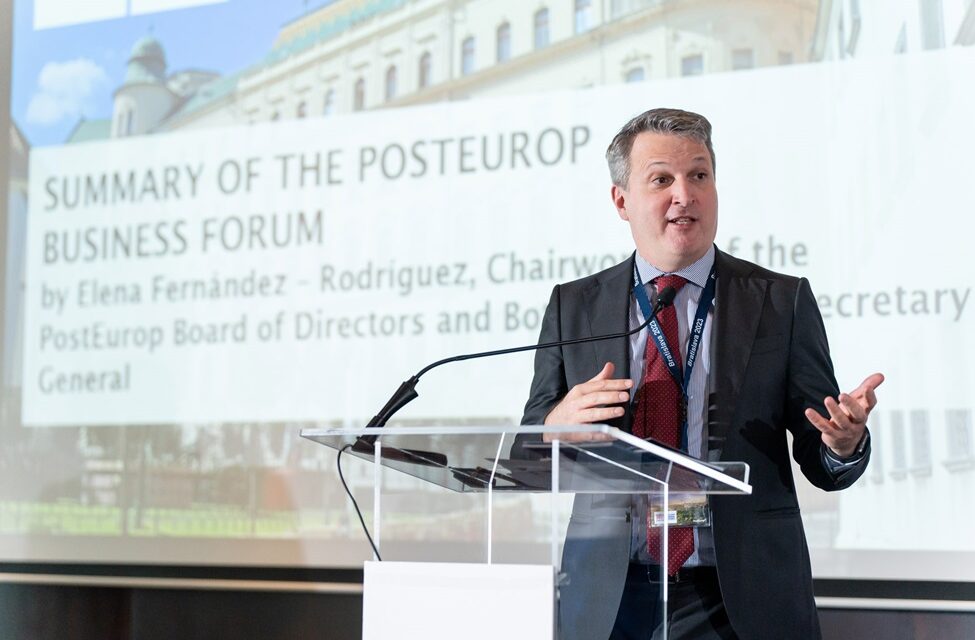
Resilience and flexibility

In a candid interview, Botond Szebeny, the Secretary General of PostEurop, discusses the sector’s ability to weather global challenges, the key obstacles that the postal sector is poised to face in 2024 and the ways in which the industry is actively contributing to a more sustainable future; from reducing CO2 emissions to fostering social responsibility.
How has the peak season has gone for the sector?
I think it has gone pretty well in efficiently serving our customers in this key period of the year. The industry has been well prepared and postal operators are always happy when they see big volumes, as volumes mean business. Of course, global challenges are still present but they have been tackling these.
How has the sector been affected by recent global challenges?
We are in a large industry with a big supply chain. So, of course, every disruption deriving from the global scenery has an impact. There was COVID, then the disruption caused by the war in Ukraine, the inflationary pressure and now the crisis in Israel and Gaza and the issues in the Red Sea. Our members are following the situation carefully. The challenges will not disappear, and postal operators will be making plans, in close co-operation with each other, to mitigate potential issues.
Beyond these global challenges, what are the key issues the sector will face in 2024?
 The number one issue for the sector, which has been with us for more than 10 years, is the falling mail volumes. As a result of this decline, the financing of the Universal Service Obligation is under pressure. We have seen a huge growth in e-commerce, but due to intense competition in the market, it is not possible to automatically compensate operators for the losses deriving from the falling letter volumes and there are also sign of the slow-down of the dynamic growth in this area.
The number one issue for the sector, which has been with us for more than 10 years, is the falling mail volumes. As a result of this decline, the financing of the Universal Service Obligation is under pressure. We have seen a huge growth in e-commerce, but due to intense competition in the market, it is not possible to automatically compensate operators for the losses deriving from the falling letter volumes and there are also sign of the slow-down of the dynamic growth in this area.
The long-term economic sustainability of the USO has to be guaranteed. And so, the governments and legislators need to ensure postal operators receive compensation for the USO burden. And at the same time the sector has to be even more competitive and do their homework to ensure they succeed in the e-commerce market and deal with the many disruption elements deriving from the digitalisation, climate and demographic changes and the emergence of e-platforms.
Why is the physical presence of the post office important?
During COVID, governments directly acknowledged that there was a need for physical services even in the most difficult periods. And we have seen this again in Ukraine where the ability to use the postal network to bring in and distribute humanitarian aid or to guarantee the access of the Ukrainian citizens and businesses to the global market has been vital.
Delivery is like oxygen – when it’s at our disposal, we take it for granted. But when there is an issue, we realise how important it is.
Is it still feasible to be delivering to every household?
Yes, but we must offer a range of solutions. The USO is about delivering to the citizens and home delivery is a key part of it. Nevertheless, we see the emergence of innovative alternative solutions such as huge parcel locker networks, run both by postal operators and their competitors. We see that this multi-channel approach can be a part of a long-term scheme.
Postal USO aside, what do you see as other challenges for 2024?
Beyond the business challenges and disruption elements already mentioned, the industry has to be prepared for the new political cycle as there will be elections in the European Union. This may also bring the continuation of the review of the EU postal regulation.
One particular challenge will be the review of the European Union customs rules. In terms of the pre-arrival security and safety of goods entering the EU, after the 1nd and 2nd releases of the Import Control System 2 (ICS2) in March 2021 and 2023, the final Release 3 will go live on 3 June 2024, including already all models of transport and all economic operators. On the global level, within the UPU, we also have to contribute to improving the relevance of the global postal network for the citizens and businesses.
How important is sustainability for the industry as a whole?
Sustainability has been a major focus for the industry in Europe and we have built a common vision for the sustainability efforts of the sector. We are frontrunners in this regard and have already achieved huge results in recent years.
Our members are changing their fleet, they are increasing the number of EVs delivering and they are improving energy efficiency for example by putting solar panels on the rooftop of sorting centres and more and more, their service offering reflects their commitment to sustainability.
These are just a few examples – we are proud to say that sustainability efforts have already become an integral part of our members.
What is PostEurop’s sustainability vision?
We have a clear vision of what we want to achieve for the sustainable future based on three pillars.
The first environmental pillar is about reduction of the CO2 emissions, decarbonisation of the fleet, also energy efficiency of buildings and participating in a circular economy of sustainable products. The second pillar is the social one, because we are a human intensive industry, and it is important that we have a balanced and modern approach towards the 2 million employees. This relates, among others, to training, diversity, gender balance and social dialogue. And the third pillar is economic and related to the postal USO. As you can see, sustainability is a major challenge and priority for us, and we will continue to focus on these efforts in 2024.
How important is AI is for the industry?
I think it is important for the sector to keep on top of all innovations and be open to the possibilities, like we have done in recent years with the automation of sorting, or the automation of delivery through parcel lockers as well as trialling drone delivery.
Artificial Intelligence will definitely become part of our life, but it is at a relatively early stage, and our members are looking carefully at potential applications.
 Digitalisation has characterised the transformation of the postal industry but when it comes down to it the bulk of the postal world is a physical world, and in recent years, we have had to build a fully-fledged, data-based digital channel, parallel with the traditional, physical one.
Digitalisation has characterised the transformation of the postal industry but when it comes down to it the bulk of the postal world is a physical world, and in recent years, we have had to build a fully-fledged, data-based digital channel, parallel with the traditional, physical one.
All applications that support the physical conveyance of the goods that we are responsible for, are digital, for example the widely used track-and trace solutions. I think that artificial intelligence can indeed play a role in making operational and business processes even more efficient and even more supportive to customers. Our main aim is to deliver goods from A to B in the optimal way. So whatever solutions can be used to support this will be welcomed by our industry.
What is the postal sector doing to remain relevant with all the competition out there?
The key issue here is how we continue to modernize and transform the postal industry. This transformation must be a sustained, intelligent, and enduring process.
Also, in terms of sustainability, it’s not only a question of regulation, but also a question of customer perception. And showing our customers that we are delivering goods and decreasing our environmental footprint is really important.
As I highlighted during our discussion on AI, as a sector we don’t sit on our laurels.
We have to stay innovative and it’s a continuous process.
20 years ago, we were a letter mail-based industry. Today, more and more postal operators are becoming e-commerce companies, surpassing the tipping point where less than half of the revenues are now generated from letter mail. We have gone through massive amount of diversification in terms of business areas, but also geographically – huge networks have been built in the industry.
How good is the industry at communicating its achievements?
I think it’s very important that we communicate on this as an industry, because we have done a great job in this transformation in terms of modernisation. But sometimes there is a sense that the public and customers still don’t fully follow what we have achieved and perceive our industry in its traditional terms only. And this is key to maintaining our customers – they need to understand what the postal industry can deliver for them under these new conditions.
How is PostEurop keeping pace with the industry?
Our role is to be part of the dynamic changes we have seen across the sector. And we also have to do our homework to keep up. PostEurop’s strategy review is currently underway with the leadership of Elena Fernandez-Rodriguez, Chairwoman of PostEurop Board since January 2023. Its first phase has been just implemented based on the decision at our latest General Assembly in Bratislava in October 2023, and a new organisational entity was created within our organisation dealing with the ESG – sustainability – issues. The organisational review has confirmed the organisation’s role in the areas of European and global regulatory affairs, sharing best practice across the sector and to deal with common development projects. As a next phase, we are also revising our vision, mission and objectives to ensure PostEurop is really future proof. Our industry is transforming and we are looking to the future to accompany our members in this fascinating journey.
About Botond
Since 2009 Botond Szebeny, Secretary General of PostEurop, has been responsible for co-ordinating the activities of the Association implemented in various fields including regulations (EU and UPU), operations, CSR, market, e-commerce, sustainability and customs, as well as leading the Headquarters of the Association located in Brussels.
He also served in the Board of Directors of the European cross-industry campaign, Print Power.
Prior to joining PostEurop, Botond had been member of the Executive Committee at Magyar Posta for 6 years, responsible for the International Business. During that time, he was also member on the Management Board of PostEurop with the responsibility of chairing the European Union Affairs Committee (EAC) of the Association. He led various initiatives, including the UPU’s Financial Committee, and acted as external advisor to the EU’s European Economic and Social Committee.
He has university degrees in economics, diplomacy, and law, and speaks several European languages fluently.












